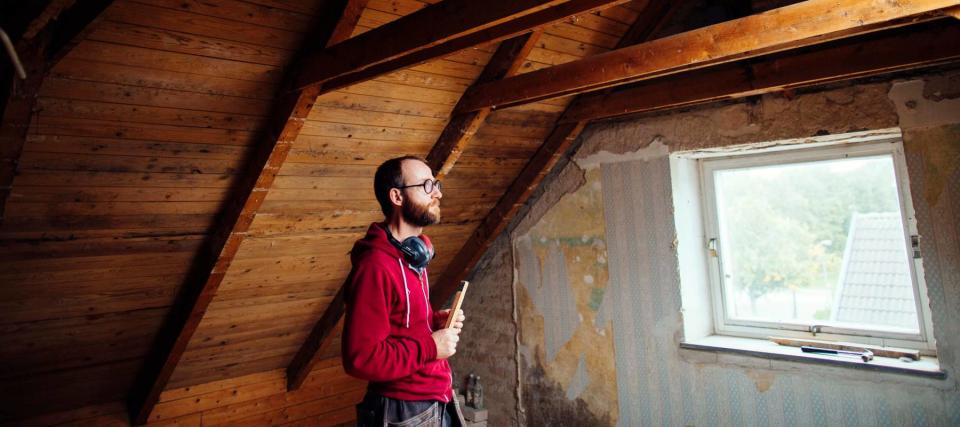My HOA is charging me $13K for hailstorm damage that happened 2 years before I bought. What are my options?

When you buy a home, you're responsible for the costs associated with it. This means that if issues are left undiscovered following an inspection, you might still have no choice but to foot the bill after you take ownership. And this holds true whether you’re buying a traditional home or a house or condo that’s part of a homeowners association (HOA).
But what if, after moving into a home that’s part of an HOA — say a townhouse in North Carolina — you’re slapped with a bill for damages from a hailstorm that occurred before you bought your home?
Don't miss
Car insurance premiums in America are through the roof — and only getting worse. But 5 minutes could have you paying as little as $29/month
Commercial real estate has beaten the stock market for 25 years — but only the super rich could buy in. Here's how even ordinary investors can become the landlord of Walmart, Whole Foods or Kroger
These 5 magic money moves will boost you up America's net worth ladder in 2024 — and you can complete each step within minutes. Here's how
You might think you’d be off the hook. But that’s not necessarily true.
The problem with HOAs
There are a number of drawbacks to owning a home that’s part of an HOA. One issue is that the dues can be hefty, and they can rise over time.
Another issue is that you may have to follow certain rules that impede your lifestyle or design choices, like say, being barred from painting your fence a certain color or having to abide by quiet hours if that’s what your HOA dictates.
And there’s always the chance you could be dealt a financial blow in the form of a special assessment. Often, special assessments come as a result of an emergency or a sudden unplanned cost. For example, if a major storm causes roof damage and your HOA’s insurance doesn't pick up the entire tab, the cost may be passed along to be shared by the members of the HOA.
Or if your HOA’s swimming pool filtering system malfunctions, you and your fellow HOA members may have to share in the cost of the repairs if your HOA’s budget can’t cover them.
You might assume that as a homeowner, you’re not required to pay for expenses your HOA incurred prior to when you purchased your home. But unfortunately, with HOAs, it’s generally the date of the assessment that matters more than the date of the event itself.
If a storm causes damage not covered by your HOA’s insurance before you move in, but your HOA imposes the assessment after you move in, you’re on the hook — not the previous owner who lived in your home at the time the damage took place. However, if the special assessment occurs before the home was sold to you, the seller generally can’t transfer that fee. Rather, they have to pay it.
Read more: Rich, young Americans are ditching the stormy stock market — here are the alternative assets they're banking on instead
Will your homeowners insurance pick up the tab?
Homeowners insurance will generally cover the cost of property damage due to an unforeseen event unless that event is excluded from coverage. For example, your insurer may not cover flood damage if you don't have a specific flood rider as part of your policy.
If you belong to an HOA that imposes a special assessment due to storm damage, it’s likely that the HOA’s insurance didn't cover part of the cost, leaving the members to do so. But in some cases, your personal homeowners insurance policy might pick up the tab for a special assessment if you add on a loss assessment coverage rider.
Progressive says that standard condo insurance policies generally provide a certain level of loss assessment coverage. But depending on your policy, it may not be enough to cover the cost of a special assessment in full. And while you can buy additional coverage for more protection, it will result in higher premiums.
If your insurance won’t cover your share of a special assessment, it’s worth reviewing your HOA’s governing documents to make sure the assessment is legal in the first place. You can also try challenging the assessment if you have reason to believe that it’s not.
Otherwise, you may be able to negotiate a payment plan with your HOA if you can’t cover the full cost of the special assessment in one fell swoop. Failing to pay HOA dues, including special assessments, could result in a range of unfavorable consequences. You may, for example, be barred from using certain amenities until you’re current on payments. Getting onto a payment plan could spare you from such repercussions if you need time to come up with your share of the bill.
What to read next
Cost-of-living in America is still out of control — use these 3 'real assets' to protect your wealth today, no matter what the US Fed does or says
Lock in juicy quarterly income through this $1B private real estate fund — even if you’re not a millionaire. Here’s how to get started with as little as $10
Jeff Bezos and Oprah Winfrey invest in this asset to keep their wealth safe — you may want to do the same in 2024
This article provides information only and should not be construed as advice. It is provided without warranty of any kind.